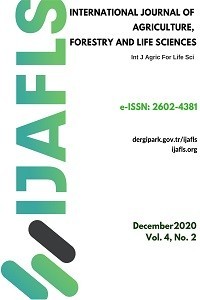Effect of social capital on private adaptation measures to climate change among farmers in Ezinihitte Mbaise, Imo State, Nigeria
Effect of social capital on private adaptation measures to climate change among farmers in Ezinihitte Mbaise, Imo State, Nigeria
Climate Change, Social Capital Private Adaptation, Socio-economic characteristics, Ezinihitte Mbaise Imo State,
___
- Agboola, W.L. (2011). Improving Fish farming Productivity towards Achieving Food Security in Osun State, Nigeria: A Socioeconomic Analysis. Annals of Biological Research Journal, 2 (3) : 62-74.
- Agulanna, E. C. (2008). The Mbaiseness of Mbaise, 2nd. edition. Owerri: Career Publishers, page 71-103.
- Ajani, O. I. Y and Tijani, G. A (2009), “The role of Social Capital in Access to Micro Credit in Ekiti State, Nigeria”, Pakistan Journal of Social Sciences 6(3), 125-132.
- Aymone, G. G. (2009). Understanding framers’ perceptions and adaptation to climate change and variability: The case of the Limpopo Basin, South Africa. IFPRI discussion paper 00849, International Food Policy Research Institute, Washington DC.
- Benhin, J. K. A. (2006). Climate change and South African agriculture: Impacts and adaptation options. CEEPA discussion paper No. 21. Centre for Environmental Economics and Policy in Africa, University of Pretoria, South Africa.
- Deressa, T. T., Hassan, R. M., Ringler, C., Alemu, T., and Mahmud, Y. (2008). Analysis of the determinants of farmers’ choice of adaptation methods and perceptions of climate change in the Nile Basin of Ethiopia. International Food Policy Research Institute. Discussion paper No. 00798. Washington, DC: IFPRI.
- Essien, U. A., Arene, C. J., and Nweze, N. J. (2013). What determines the frequency of loan demand in credit markets among small scale agro based enterprises in the Niger Delta region. Journal of Agriculture and Sustainability. 4(3) 233-241.
- Intergovernmental Panel on Climate Change, IPCC (2001). Climate change 2001: Impacts, adaptation, vulnerability. Contribution of working group ii to the third assessment report of the intergovernmental panel on climate change, Geneva: UNEP/WMO.
- Intergovernmental Panel on Climate Change, IPCC (2007). Climate change 2007: Impact, adaptation and vulnerability. Contribution of working group i of the intergovernmental panel on climate change on the third assessment report of IPCC, London: Cambridge University Press.
- Jones, P. G., and Thornton, P. K. (2002). Croppers to livestock keepers: Livelihood transition to 2010 in Africa due to climate change. Global environmental change, World Health Organization, Geneva, Switzerland.
- Kanu, I. M. (2020). Analysis of cocoa farmer’s poverty status in Abia State, Nigeria: The Foster, Greer and Thorbeck (FGT) decomposable poverty measure. International Journal of Agriculture, Environment and Food Sciences, Int. J. Agric. Environ. Food Sci., Vol. 4(2), Pg 188-199.
- Kanu, I. M., Obasi, I. O. and Onwusanya, K. (2020). Analysis of Household Energy Expenditure in Umuahia North Local Government Area of Abia State, Nigeria. International Journal of Agriculture, Environment and Food Sciences, Int. J. Agric. Environ. Food Sci., Vol. 4(4), Pg 466-475.
- Maddison D. (2006). The perception of and adaptation to climate change in Africa. In: CEEPA Discussion Paper, vol. 10: Centre for Environmental Economics and Policy in Africa, University of Pretoria.
- Montgomery, J. D. (1998). “Social capital- Research Notes”.Cambridge: Pacific Basin Research centre.
- Nhemachena, C. and Hassan, R. (2007). Micro-level analysis of farmers’ adaptation to climate change in Southern Africa . (IFPRI Discussion paper No. 00714). Washington DC, USA: International Food Policy Research Institute (IFPRI), Environmental and Production Technology Division.
- Nwaru, J. C., and Onuoha, R. E. (2010). Credit use and technical change in smallholder food crop production in Imo State, Nigeria. New York Science Journal, 3(11), 144-151.
- Oluwatayo, I. B. (2009). Towards assuring household’s food security in rural Nigeria: Have cooperatives got any place? International Journal of Agricultural Economics and Rural Development, 2(1): 52-61.
- Onubuogu, G. C., and Esiobu, N. S. (2014). Trends, perceptions and adaptation options of arable crop farmers to climate change in Imo State, Nigeria: Multinomial logit model approach. Scholarly Journal of Agricultural Science Vol. 4(7), pp. 370-385 July, 2014.
- Orindi V.A., and Eriksen S (2005). Mainstreaming Adaptation to Climate Change in the Development Process in Uganda. In: Ecopolicy Series vol. 15 Kenya, Nairobi: African Centre for Technology Studies.
- Otitoju, M. A., and Enete, A. A. (2014). Climate change adaptation strategies and farm-level efficiency in food crop production in Southwestern, Nigeria. Tropicultura, 2014, 32, 3, 113-120.
- Ozor, N., and Nnaji, C. (2011). Difficulties in adaptation to climate change by farmers in Enugu State, Nigeria. Journal of Agricultural Extension Vol. 14 (2), December 2011.
- Temesgen T, R. Hassan, C. Ringler, T. Alemu, and M, Yesuf (2009). “Determinants of farmers’ choice of adaptation methods to climate change in the Nile Basin of Ethiopia.” Global Environmental Change 19: 137-316.
- Yayın Aralığı: Yılda 2 Sayı
- Başlangıç: 2017
- Yayıncı: Volkan OKATAN
Chidinma Rosemary OKEZIE, Ifeanyı Moses KANU, Reward Onyinyechi NWOSU
Determination of the production process and some quality properties of Biga cheese dessert
Aynur ASLAN, Gulgun TİRYAKİ, Zayde AYVAZ, Hüseyin AYVAZ
Nuray ÇÖMLEKÇİOĞLU, Mustafa Kemal SOYLU, Murat OLGUN
Rafael TOMADA, Ulysses CAGASAN
Socio-economic impact of labour out-migration among farming households in Achham, Nepal
Sunil JOSHİ, Shiv DHAKAL, Aashtha DAHAL
İbrahim KAHRAMANOGLU, Chunpeng WAN
Olugbenga ALABI, Azeez IBRAHİM, Ebunlola OMOLE, Abiade Samson OLUMUYİWA, Olugbenga OLADELE, Olusegun Noah OSUNDIYA
Effects of caper (Capparis spinosa L) jam on the physical and chemical properties of ice cream
Engin GÜNDOĞDU, Ahmed MENEVSEOGLU, Hilal COLAKOGLU YENİAY, Fatma HEZER
Possible economic effects of musilage on Sea of Marmara fisheries
